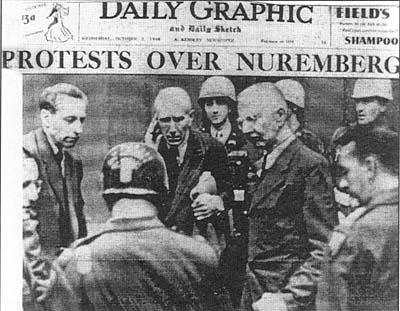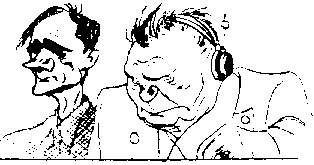Conclusion
and the Legacy of the Nuremberg Trials
 |
In 1945 the idea of an International Military Tribunal was unprecedented. Creating a forum to legitimately try enemy prisoners under a fair legal system had never been attempted and many questioned whether World War II was the time to try it. The governments of the Allies and France believed that a trial, following an established legal system, was a better option than an untried military execution. Consequently, the IMT was formed and it tried Nazi prisoners.
The IMT was not a perfect system. It was undoubtedly a form of victor’s justice. It was biased. It was not truly international. It was too limited. It arbitrarily omitted and included controversial evidence. It deserves a certain amount of criticism but regardless of its failings the IMT did provide the Nazi defendants with as fair a trial as was possible. There was not a large enough group of anti-fascist German citizens, in Germany in 1945, to form a tribunal or dispense justice. The IMT was biased because three of the four nations taking part in the prosecution had directly experienced World war II on their own soil but no other nations at this time were strong enough for such an undertaking as the IMT and nearly every nation in Europe had experienced fighting on its soil during World War II. The arbitrariness of the court in allowing and omitting certain evidence was not fair but it is questionable if this arbitrariness significantly changed the ruling of the court.
 |
Overall, the IMT did provide the Nazi defendants with a fair trial simply because it allowed them a trial. The Allies overcame the urge to indiscriminately execute every prisoner they took and inside decided to subject them to the rule of law.
The creation of the IMT led to subsequent trials of lesser Nazi officials, trials of Nazi doctors, who performed horrifying experiments on people in prison camps, establishing an International Military Tribunal for the Far East, to try Japanese officials for crimes against humanity, the Eichmann trial, which focused on the extermination of European Jews, and set standards for the present day courts at The Hague, for trying crimes committed during the Balkan wars of the early 1990s, and at Arusha, for trying the people responsible for the genocide in Rwanda.
LINKS
www.law.umkc.edu/faculty/projects/ftrials/nuremberg/subsequenttrials.html
www.law.umkc.edu/faculty/projects/ftrials/nuremberg/NurembergDoctorTrial.html
Web page by Amy Suelzle
Revised 12/7/02